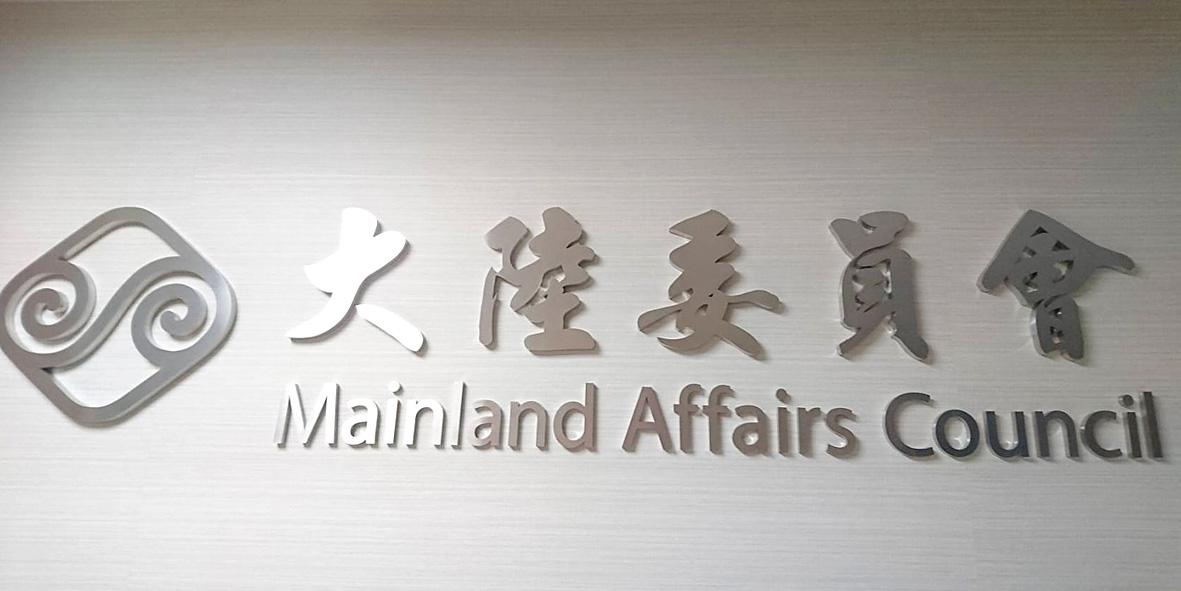Taiwanese who do business in China should exercise caution, the Mainland Affairs Council (MAC) said yesterday, after China’s Taiwan Affairs Office (TAO) announced a new policy to attract individual investors and entrepreneurs.
At a news conference in Beijing, TAO spokeswoman Zhu Fenglian (朱鳳蓮) said that Taiwanese could register as individuals engaged in 122 categories — up from 24 categories — of industrial or commercial activity in specified areas of China.
Taiwanese operating out of Beijing, Shanghai, Guangdong Province or one of 24 other provinces or municipalities in China would be eligible to register directly with the Chinese government to invest or engage in entrepreneurship in the specified categories, Zhu said.

Photo: Chung Li-hua, Taipei Times
The Chinese policy, which follows the “31 incentives” for Taiwanese students and businesspeople announced by Beijing in 2018, is evidence that “China’s philosophy of both sides of the Taiwan Strait being one family will not change,” she said.
The policy is part of a pilot program by the Chinese government to spur innovation in trade and the services industry, while “offering support to Taiwanese compatriots, particularly young people, who wish to engage in entrepreneurship” in China, she said.
In Taipei, the council said that policies implemented by the Chinese Communist Party have been detrimental to the business environment in China, and that Taiwanese should anticipate heightened supervision, energy restrictions and the promotion of state-owned enterprises over private entities.
Amid heightened tensions across the Taiwan Strait, there is also the risk of Taiwanese in China being identified as financiers of Taiwanese independence, the council said.
Taiwanese planning to enter the Chinese market should carefully consider these factors and evaluate the situation before doing so, it said.
While the new Chinese policy is unlikely to attract a large number of Taiwanese, the council said that it would continue to monitor developments.
The council reminded Taiwanese that laws and social values in China are “very different” from those in Taiwan, and that people planning to operate out of China should “exercise caution.”
Separately, Democratic Progressive Party Legislator Wang Mei-hui (王美惠) criticized the new Chinese policy, saying that it is another example of Beijing “promoting unification through economics.”
The policy ultimately aims to defraud Taiwanese investors in China, Wang said.
“Beijing already messes with large corporations operating in China,” she said. “Now individual investors there will also lose their shirts.”
China steals talent and technology from Taiwanese by attracting them to the country through the false pretense of offering beneficial conditions, she said.
“It is not easy to make money in China, particularly now that China is in an economic downturn,” she said.
“That is why many Taiwanese businesspeople have over the past few years been bringing their investment money back home,” she added.

A magnitude 7.0 earthquake struck off Yilan at 11:05pm yesterday, the Central Weather Administration (CWA) said. The epicenter was located at sea, about 32.3km east of Yilan County Hall, at a depth of 72.8km, CWA data showed There were no immediate reports of damage. The intensity of the quake, which gauges the actual effect of a seismic event, measured 4 in Yilan County area on Taiwan’s seven-tier intensity scale, the data showed. It measured 4 in other parts of eastern, northern and central Taiwan as well as Tainan, and 3 in Kaohsiung and Pingtung County, and 2 in Lienchiang and Penghu counties and 1

FOREIGN INTERFERENCE: Beijing would likely intensify public opinion warfare in next year’s local elections to prevent Lai from getting re-elected, the ‘Yomiuri Shimbun’ said Internal documents from a Chinese artificial intelligence (AI) company indicated that China has been using the technology to intervene in foreign elections, including propaganda targeting Taiwan’s local elections next year and presidential elections in 2028, a Japanese newspaper reported yesterday. The Institute of National Security of Vanderbilt University obtained nearly 400 pages of documents from GoLaxy, a company with ties to the Chinese government, and found evidence that it had apparently deployed sophisticated, AI-driven propaganda campaigns in Hong Kong and Taiwan to shape public opinion, the Yomiuri Shimbun reported. GoLaxy provides insights, situation analysis and public opinion-shaping technology by conducting network surveillance

‘POLITICAL GAME’: DPP lawmakers said the motion would not meet the legislative threshold needed, and accused the KMT and the TPP of trivializing the Constitution The Legislative Yuan yesterday approved a motion to initiate impeachment proceedings against President William Lai (賴清德), saying he had undermined Taiwan’s constitutional order and democracy. The motion was approved 61-50 by lawmakers from the main opposition Chinese Nationalist Party (KMT) and the smaller Taiwan People’s Party (TPP), who together hold a legislative majority. Under the motion, a roll call vote for impeachment would be held on May 19 next year, after various hearings are held and Lai is given the chance to defend himself. The move came after Lai on Monday last week did not promulgate an amendment passed by the legislature that

AFTERMATH: The Taipei City Government said it received 39 minor incident reports including gas leaks, water leaks and outages, and a damaged traffic signal A magnitude 7.0 earthquake struck off Taiwan’s northeastern coast late on Saturday, producing only two major aftershocks as of yesterday noon, the Central Weather Administration (CWA) said. The limited aftershocks contrast with last year’s major earthquake in Hualien County, as Saturday’s earthquake occurred at a greater depth in a subduction zone. Saturday’s earthquake struck at 11:05pm, with its hypocenter about 32.3km east of Yilan County Hall, at a depth of 72.8km. Shaking was felt in 17 administrative regions north of Tainan and in eastern Taiwan, reaching intensity level 4 on Taiwan’s seven-tier seismic scale, the CWA said. In Hualien, the